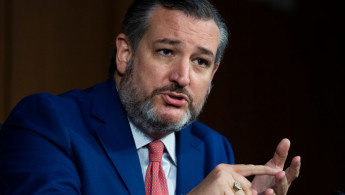Ted Cruz blocks Biden pick for top Middle East diplomat post
US Senator Ted Cruz has blocked President Joe Biden’s choice of candidate to lead the State Department’s Middle East bureau.
The Texas lawmaker’s objections have blocked Barbara Leaf’s path to becoming the assistant secretary of State for Near Eastern affairs.
In a letter seen by Politico, Cruz, who sits on the Foreign Relations Committee, claimed that Leaf did not answer three written questions submitted by Cruz satisfactorily; and even went as far to accuse Leaf of lying.
Barbra Leaf is known as a top Middle East National Security Council official.
In his written questions, Cruz requested information regarding the Biden administration’s approach to reducing pressure on Iran, outside the scope of the 2015 nuclear accord, he sought clarification about reports that claimed the State Department would no longer refer to the Abraham Accords, but rather refer to the “normalisation agreements”; and finally, he questioned a reported decision by the Biden administration to withhold $130 million in aid from Egypt.
Cruz, a friend of former president Donald Trump, has been a vocal opponent of any deal with Iran and a firm supporter of the Abraham Accords.
Cruz’s block angered his colleagues and fellow committee members across the aisle, with one branding his actions as “grandstanding”.
“Senator Cruz’s objection to Barbara Leaf has NOTHING to do with her qualifications,” Democratic Senator Chris Murphy wrote on Twitter.
“It’s just more political grandstanding that leaves America vulnerable without a top diplomat in the Middle East,” he added.
In her response to Cruz’s question regarding the Biden administration’s efforts to reduce pressure on Iran “other than reentry into the Joint Comprehensive Plan of Action”, Leaf issued a denial.
“There have been no such arrangements, deals, or agreements contemplated to reduce pressure on Iran,” she wrote.
Cruz hit back saying “That testimony is false.”
Cruz cited two articles by Reuters, one of which claimed that the US was considering “an option where both sides would take small steps short of full compliance to buy time.” The other suggested that the US was considering another similar approach for a reduction in sanctions.
Neither article claimed that the proposals are designed to “reduce pressure on Iran”.
In further objections to Leaf’s appointment, Cruz demanded to know the names, affiliations, and specific charges, of the 16 individuals being held in Egypt, which the US has called to be released.
Cruz demanded to know if the release of the withheld aid was dependent on their release, whether the individuals were members of an Islamist group, and if the US intended to give them visas.
“Leaf wrote back responses running to almost a thousand words. She answered 0 of the questions,” Cruz wrote in response to Leaf's answer.
If Cruz continues to uphold his objection, the Biden administration could be forced into providing a further explanation of its Middle East policy, using time on the floor of the Senate to manoeuvre around the hold, or withdrawing the nomination of Leaf.





 Follow the Middle East's top stories in English at The New Arab on Google News
Follow the Middle East's top stories in English at The New Arab on Google News
![The UAE is widely suspected of arming the RSF militia [Getty]](/sites/default/files/styles/image_330x185/public/2024-11/GettyImages-472529908.jpg?h=69f2b9d0&itok=Yauw3YTG)
![Netanyahu furiously denounced the ICC [Getty]](/sites/default/files/styles/image_330x185/public/2024-11/GettyImages-2169352575.jpg?h=199d8c1f&itok=-vRiruf5)
![Both Hamas and the Palestinian Authority welcomed the ICC arrest warrants [Getty]](/sites/default/files/styles/image_330x185/public/2024-11/GettyImages-2178351173.jpg?h=199d8c1f&itok=TV858iVg)